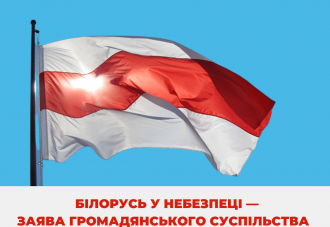The Independent Media Council strongly condemns the harsh repression of freedom of expression and media freedom in Belarus. Protests continue in the country after the disputed presidential election, and with them attacks, mass arrests, detentions and even disappearances of journalists and media workers solely because of their professional activity. Such behavior undermines the foundations of democracy, where the media can freely provide citizens with fair and balanced information about social events thus ensuring the transparency and accountability of government.
Violations of media freedom in Belarus
Since August 9, 2020, the Belarusian Association of Journalists (BAJ) has reported on more than 500 violations of media freedom committed by government officials, including:
- over 480 cases of detention of journalists;
- 97 journalists who endured administrative arrests;
- 62 journalists who were physically abused by law enforcement agencies;
- criminal proceedings instituted against 15 journalists;
- nine of them being currently held in custody.
Among the prisoners are tut.by journalist Katsiaryna Barysevich, journalist Andrei Alyaksandrau, Belsat TV journalists Katsiaryna Andreyeva (Bakhvalova) and Darya Chultsova, the employees of Press Club Belarus: founder Yulia Slutskaya, program director Alla Sharko, director Sergei Olshevsky, operator Pyotr Slutsky, as well as former Belteleradiocompany journalist Ksenia Lutskina.
All of this is evidence of the Belarusian government’s large-scale repression against journalists for exercising their right to freedom of expression. Of particular concern is the fact that the repression continues despite condemnation by the international community and the sanctions imposed by the EU Council against high-ranking Belarusian officials, responsible for repression and intimidation of journalists.
The Illegal court decision in the “Zero Ppm” case
On March 2, 2021, the Moskovsky District Court in Minsk sentenced tut.by journalist Katsiaryna Barysevich to six months imprisonment for disclosing medical information (Part 3 of Article 178 and Part 5 of Article 16 of the Criminal Code of the Republic of Belarus).
The journalist who reported on the circumstances of the brutal torture and death of a peaceful protester, Raman Bandarenka, noted in her article of November 13, 2020, that there was no alcohol in his blood. Such information contradicted the authorities’ official position that Raman Bandarenka was intoxicated and provoked a fight, actually revealing the authorities’ attempt to conceal human rights violations. Katsiaryna Barysevich was detained on November 19, 2020. She was called a prisoner of conscience by Amnesty International.
The Independent Media Council considers the court decision against Katsiaryna Barysevich arbitrary and strongly urges that her case be reviewed.
Although Article 178 of the Criminal Code of the Republic of Belarus seeks to protect the right to privacy, disclosing medical information without patient consent is justified for a socially necessary purpose, including human rights and when the public’s right to know this information outweighs the potential harm of its dissemination. Besides, Raman Bandarenka’s immediate relatives did not in any way withhold information about the victim’s condition from journalists. Therefore, there is lack of corpus delicti in the case, i.e. criminal prosecution does not meet the requirements of legality. The court convicted Katsiaryna Barysevich for political reasons, solely for exercising her right to freedom of expression.
Persecution of journalists for “organizing protests”
On January 12, 2021, Andrei Alyaksandrau was detained together with his girlfriend Iryna Zlobina for organization and preparation of acts that grossly violate public order, or an active participation in them (Part 2 of Article 342 of the Criminal Code of the Republic of Belarus).
The fact of the matter is that, in addition to his work as a journalist, Andrei Aleksandrau, with the support of the By_Help solidarity fund, helped pay the fines of those detained during the protests and reimbursed their detention related costs. Such actions are deemed the financing of protests by law enforcement agencies.
There were also other media workers detained under the aforesaid Article, and on February 18, 2021, the Frunzensky District Court in Minsk sentenced Belsat TV journalists Katsiaryna Andreyeva and Darya Chultsova to two years of imprisonment. The journalists broadcast live a protest on November 15, 2020, during which Belarusians demanded a change of president and government’s accountability over torturing the protesters and murdering Raman Bandarenka.
At the last court hearing, the lawyers submitted to the court an expert opinion by the international organization Article 19 stating that prosecuting the journalists for “organizing violations of public order” solely because they carried out their role (i.e. gathering and sharing important information about peaceful protests) infringes international standards and is contrary to common sense. Unfortunately, the court did not take into account this expert opinion, nor did it issue an acquittal in the case.
The Independent Media Council considers the prosecution of journalists for “organizing violations of public order” arbitrary and strongly urges that the case against the Belsat TV journalists be reviewed and criminal charges against Andrei Aleksandrau dropped.
The journalists’ reports do not constitute the crime of “organization and preparation of acts that grossly violate public order, or an active participation in them.” Because according to numerous news reports, the protests on November 15, 2020 were peaceful and cannot be deemed a violation of public order.
The court had neither a legitimate basis for criminal prosecution, nor a legitimate aim. Because, in order to restrict rights for the purpose of protecting public order, it is necessary to consider the scale and nature of protests, obstruction to pedestrian traffic, any works that the authorities intended to carry out, or the traffic on neighboring streets, which the court did not do. The European Court of Human Rights noted this in its decision in Shmorgunov and others v. Ukraine when analyzing EuroMaidan protests in Ukraine in 2013-2014.
The prosecution for covering peaceful protests may in no way be deemed necessary to protect public order. From this it can be concluded that the Belarusian court sought not to protect public order, but rather to suppress peaceful protests and intimidate the journalists covering such events.
Persecution of Press Club Belarus
On December 22, 2020, the employees of Press Club Belarus (Yulia Slutska, Alla Sharko, Sergei Olshevsky, Pyotr Slutsky) and former Belteleradiocompany journalist and member of the Press Club Academy Ksenia Lutskina were detained and charged for large-scale tax evasion (Part 2 of Article 243 of the Criminal Code of the Republic of Belarus).
According to the investigation, the Press Club received large sums of money from abroad, in particular for creating public television that former state television journalist Ksenia Lutskina allegedly intended to create. At the same time, the detainees were not shown any documentary evidence of the amount of unpaid taxes.
It should be noted that the Press Club Academy did hold a hackathon of media projects. Out of more than 30 applications, the jury selected seven media projects aiming at promoting freedom of speech, including the video project by Ksenia Lutskina. This project, however, is in no way related to television. Belarusian human rights activists immediately recognized the five detainees as political prisoners stressing that it was not the first time that the Belarusian authorities were using economic crimes to repress journalists.
The Independent Media Council believes that the Press Club journalists were detained for political reasons, solely for exercising their right to freedom of expression, and strongly urges that criminal charges against them be dropped and they be released from custody.
Independent Media Council’s position
The right to freedom of expression, protected by Article 10 of the European Convention on Human Rights and Article 19 of the International Covenant on Civil and Political Rights is one of the fundamental elements of any democratic society. According to General Comment no.34 to the International Covenant on Civil and Political Rights, the media ensure the public’s right to be informed and knowledgeable about the events of public interest. In particular, the public has a right to know about peaceful protests in the country, including information about instances of ill-treatment and torture of peaceful protesters and other human rights violations on the part of the authorities occurring during such protests.
Any restrictions on the right to freedom of expression must be prescribed by law, have a legitimate aim and be necessary in a democratic society. While criminal prosecutions of journalists in Belarus have no valid legal basis aiming to suppress the protests and demands for a democratic change of government, they are excessive and obviously contrary to international human rights standards.
Belarus’s situation with freedom of expression is unacceptable and requires prompt and decisive action to protect and ensure human rights and the rights of citizens. Because, given the media’s vital role in disseminating information about social events, constant persecution of journalists solely for exercising their right to freedom of expression has a cooling effect and increases the pressure on society in general.
The Independent Media Council condemns arbitrary interference with the freedom of expression in Belarus, including the unlawful persecution and punishment of journalists, and calls on the Belarusian authorities to:
- immediately release all the journalists imprisoned or detained for political reasons for exercising their right to freedom of expression;
- refrain from further persecution and similar charges;
- end all forms of persecution of journalists and media workers for exercising their right to freedom of expression;
- conduct an independent, prompt, thorough, effective investigation into the acts of violence against journalists by law enforcement agencies to bring the perpetrators to justice;
- respect the rights of the citizens to freedom of expression and peaceful assembly;
appeals to the President of Ukraine, the Verkhovna Rada of Ukraine, the Cabinet of Ministers of Ukraine and the Ministry of Foreign Affairs of Ukraine to:
- publicly condemn the repressions of journalists by the Belarus authorities;
- demand that the Belarus authorities immediately stop persecuting journalists and other human rights violations;
- urgently consider imposing and/or strengthening Ukraine’s sanctions against high-ranking Belarusian officials involved in human rights violations;
- call on the governments of partner countries to impose stricter sanctions against high-ranking Belarusian officials involved in human rights violations.



